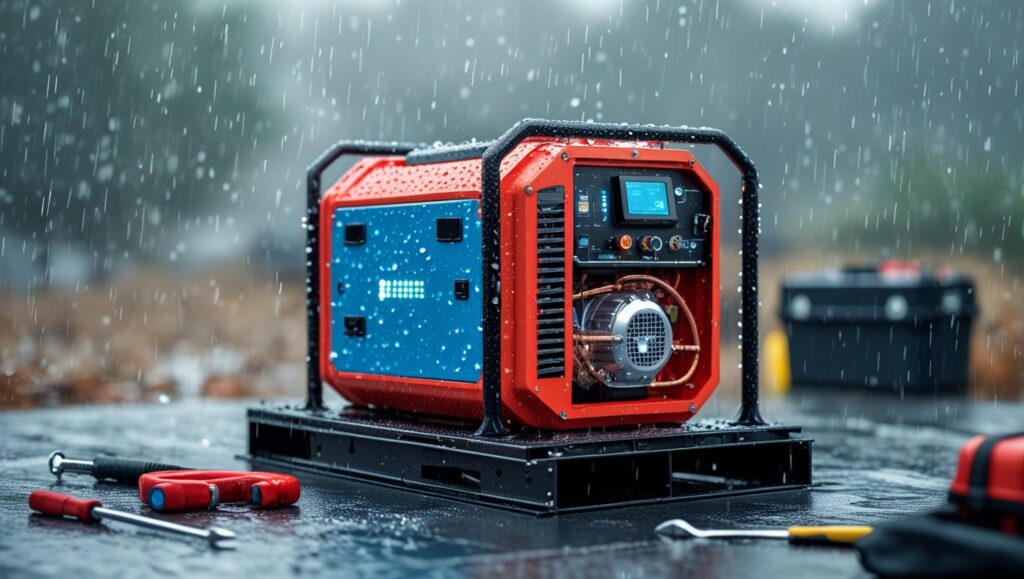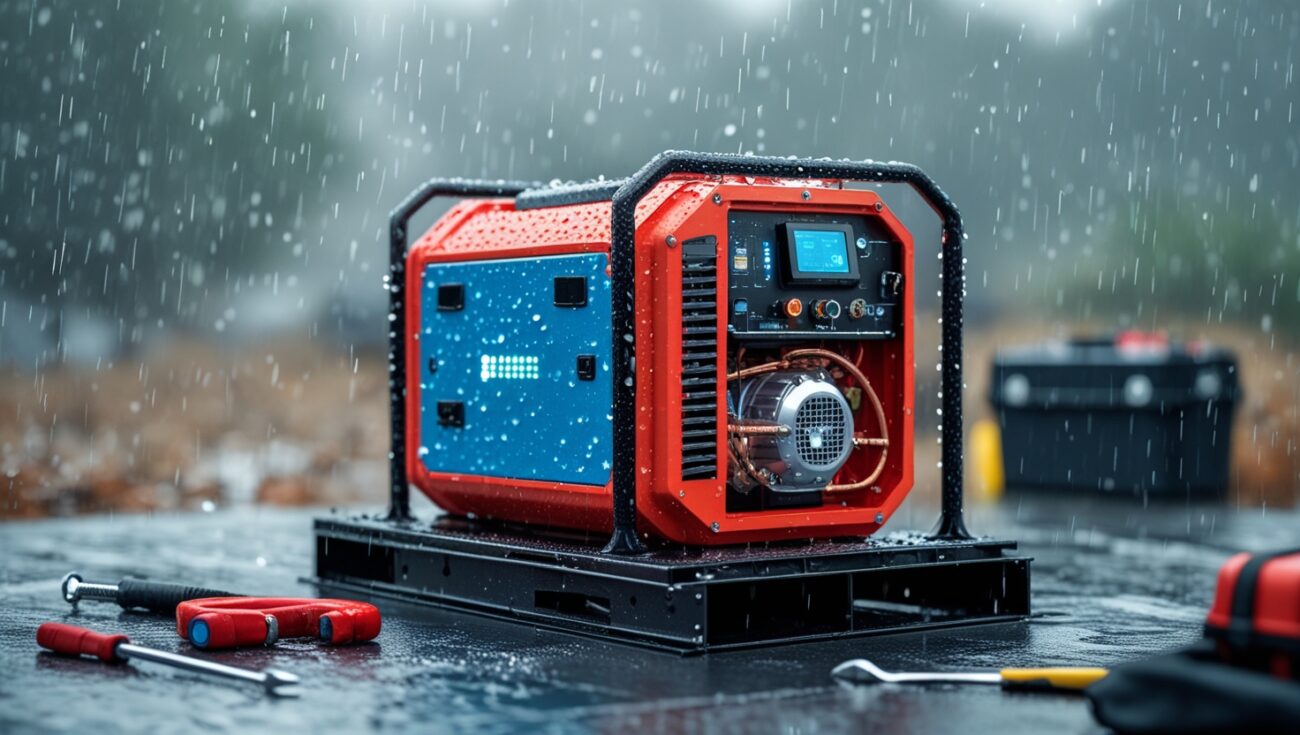This DIY Generator Setup Works in Any Weather (And Costs Less)
I used to think reliable backup power had to be expensive. Everyone talks about solar generators, propane tanks, or gasoline-powered systems that require maintenance, fuel storage, and sunlight.
But I found something different. Something that actually works — in rain, snow, blackout conditions, and even indoors — without needing sunshine or fossil fuels.
This DIY power system is the one I chose, and I’ll never go back.

Table of Contents
The Problem With Most Backup Power Systems
Let’s be real:
- Solar doesn’t work well in winter or cloudy weather
- Gasoline is hard to find during emergencies
- Propane generators are bulky, noisy, and expensive
- All of them cost hundreds to thousands of dollars upfront
Worse, once something breaks or fuel runs out, you’re done.
That’s why I started searching for something more sustainable and practical. And what I found honestly changed the game.
A Generator You Can Build Yourself — With No Experience
I’m not an electrician. I don’t have a shed full of tools. But this system? It’s made for people like me. With just basic items I picked up from the local hardware store, I was able to follow a step-by-step guide and build a low-cost power system that runs quietly, indoors or out, rain or shine.
Here’s the same guide I followed.
Works in All Weather — No Sun or Fuel Needed
Unlike solar panels that depend on UV rays or generators that require fuel, this system stores energy and delivers it when you need it, no matter what the skies are doing outside.
I tested mine during a thunderstorm and again in the snow — it held up beautifully both times.
Why It Costs Way Less (And Works Better for Emergencies)
What shocked me most? The total cost was under $300. That’s a fraction of what I’d have paid for even the smallest solar setup.
And it didn’t need:
- Permits
- Installers
- Maintenance
- Ongoing fuel expenses
Just a bit of time, some basic materials, and a blueprint that actually made sense.
Portable, Silent, and Safe
This thing runs quietly, doesn’t produce harmful fumes, and can be moved from room to room or packed in a vehicle if you’re evacuating. It doesn’t draw attention, doesn’t alert the whole neighborhood, and doesn’t attract thieves during a blackout.
I Sleep Better Knowing My Family Is Covered
There’s nothing like the feeling of watching the lights flicker during a storm… and knowing you’re prepared. I keep my phone charged, a few lights on, and even run a mini-fridge when needed — all thanks to this off-grid DIY generator system.
If I Can Build It, Anyone Can
Seriously — if you can follow basic instructions and know how to use a screwdriver, you can make this happen. And once it’s built, it’s yours. No subscription. No maintenance contracts. No technician required.
This is the best place to get started if you want real independence.
Final Thoughts
Don’t wait for the next power outage to wish you had a plan. If fuel runs out or solar doesn’t cut it, you’ll want something that works in any weather, any time — even during a long-term crisis.
This setup changed the way I think about backup energy.
And I believe it can change the way you prepare too.
Click here to see the exact system I used and how you can build it yourself.
I Didn’t Want to Depend on Anyone
One of the biggest lessons I’ve learned from watching storms, fires, and grid failures across the country is this: you can’t rely on the system to save you. When power lines go down or supply chains break, you’re on your own. That’s not fear talking — it’s reality. That’s why I knew I had to act.
What I Found Wasn’t Just Cheaper — It Was Smarter
I expected to trade off quality or output when I went DIY. But this setup? It’s not just more affordable, it’s more reliable because it doesn’t depend on the same fragile systems that fail us during emergencies.
I Built It in a Weekend (With No Special Tools)
I followed the guide closely, took a trip to my local hardware store, and built the whole thing over the weekend. I didn’t need fancy gear or power tools. Just a few basics — and the instructions laid it all out clearly, even for a complete beginner like me.
Here’s the guide that made it possible.
Maintenance-Free Is My Favorite Part
One of the things I hate about gas generators is maintenance. Oil changes, fuel rotation, filter replacements — it’s a constant hassle. This setup? No maintenance required. I set it up and it just works.
It’s Peace of Mind in a Crisis
When power goes out and stores close, you want to know that your home is covered. This system gives me enough power to run essentials like lights, phones, a router, and even a small cooktop. That peace of mind? You can’t put a price on it.
Perfect for Small Homes, Apartments, or Cabins
Whether you live in a high-rise, a suburban neighborhood, or out in the woods, this works. It’s compact enough to use in tight spaces but powerful enough to keep your essentials running. I even built a second unit for my RV.
It’s Quiet Enough to Use While You Sleep
This was a big win for me. Most generators are too noisy to run overnight. This system is practically silent. That means I can charge my phone or keep a light on without keeping the whole family awake — or alerting the neighborhood.
Nobody Knows I Have It — That’s the Point
In a crisis, you don’t want people knowing you have power. Desperation makes people do crazy things. This system doesn’t hum, rumble, or attract attention. That’s a huge security benefit.
It Doesn’t Rely on Weather or Supplies
Snowstorm? No problem. Cloudy week? Doesn’t matter. Gas shortage? Irrelevant. This thing works no matter what’s happening outside. And that makes it one of the smartest emergency purchases I’ve ever made.
Why Wait Until It’s Too Late?
Every year, people say they’ll prepare “next time.” Then the next disaster hits and they’re left in the dark — literally. The best time to build your power setup is now, when you’re calm, clear-headed, and the stores still have supplies.
This is the guide I used to build mine — and I trust it completely.
I’ve Referred Friends and Family Too
After seeing how well this system worked, I started telling others. My brother built one for his apartment. A neighbor built hers for hurricane season. It’s spreading fast because it’s simple and it works.
What Will You Do When the Lights Go Out?
That’s the real question. Because storms don’t give warnings. The grid won’t call you in advance. You either have a plan — or you don’t. This backup system made me feel ready for the first time in my life.

